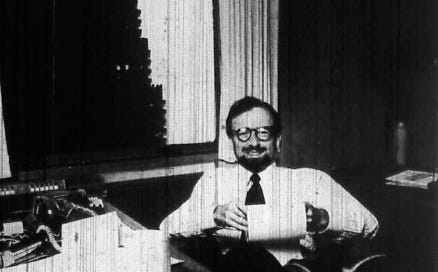Robert Wilson and The Danger of Hubris
“It’s been a quiet life. The market has provided the excitement.” Robert Wilson
Hello everyone,
What two things would Buffett recommend we refrain from on our quest for wealth? First, there’s leverage. Buffett compared debt to the “dagger mounted on the steering wheel of a car.” Sure, the driver would be more careful and attentive. But any pothole could kill them.
The roads of business are riddled with potholes; a plan that requires dodging them all is a plan for disaster.
Ok, careful with leverage. How about short selling? Not exactly Buffett’s cup of tea either. That’s not because finding terrible or overvalued companies is particularly difficult (there should be plenty). It’s just difficult to profitably short-term without blowing up over time. Buffett again:
There’s nothing evil, per se, about selling things short. I would say that it’s a very, very tough way to make a living. It’s not only often painful financially, it’s very painful emotionally.
I’ve probably had a hundred ideas of things that should be shorted, and I would say that almost every one of them have turned out to be correct. And I bet if I’d tried to make money out of it, I probably would have lost money. I would have had no fun, and the opportunity cost, as Charlie said, would have been enormous.
What if we combined leverage and short selling? Sounds like a modern hedge fund. But what if, instead of having a team of portfolio managers and analysts, hundreds of long and short positions were managed by just one person? And what if, instead of getting wealthy on management fees and carried interest, it was all one investor’s capital, leveraged to the hilt to compound?
You would have to be a madman to do this. Nobody would attempt to get wealthy this way, right? Right?
Well, that was pretty much Robert Wilson’s formula. His life is one of those unlikely and remarkable stories that can only happen in the stock market.
Wilson was born in 1926 and grew up in Detroit. He began his career in the trust department of National Bank of Detroit and promptly lost his first nest egg trading on margin. A few years later, in 1958, he started again with a $15,000 inheritance. Most people would have abandoned the idea of using leverage after getting wiped out. But Wilson doubled down. He borrowed as much as he could obtain, venturing to Switzerland to circumvent US margin rules. However, now he also hedged his portfolio by shorting. His specialty was to “pop balloons,” to short overhyped stocks he expected to collapse.
With his leveraged but hedged portfolio he navigated a market break in 1962. His formula worked and he told his wife: “Now I know that I can get rich. Now it is just a matter of getting rich.” He just needed to keep at it. And survive.
The Banana Peel
During the 2002 annual meeting, Buffett was asked about short-selling and used Wilson as an example of a “very, very smart guy” who “made a lot of money shorting stocks”. But, Buffett cautioned, “it just takes one to kill you.”
It’s true: in another timeline we might not be talking about Wilson at all. He could have ended up as a footnote in the history of failed operators and financial folly, blowing up in the GameStop-style short squeeze of his day. After becoming one of the most prominent short sellers on Wall Street in the 1970s, hubris nearly killed him.
I had God-like success on the short side in the 1970s. I shorted about a thousand stocks, and maybe five went up.
After that kind of success, during a terrible decade for markets no less, it’s not surprising that Wilson’s ego was swelling. Or as he later quipped: “Sooner or later, everybody fucks up.”





